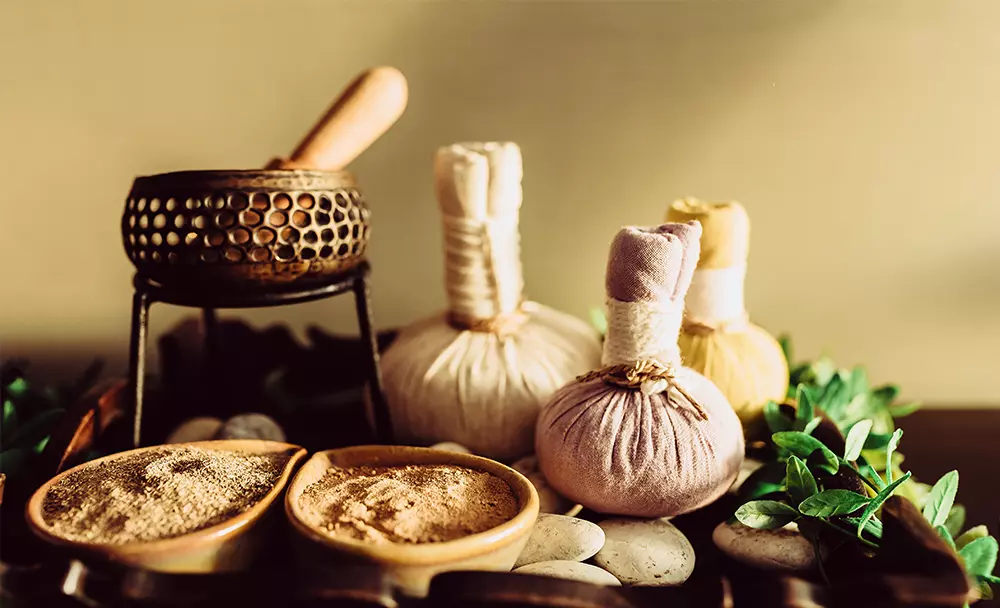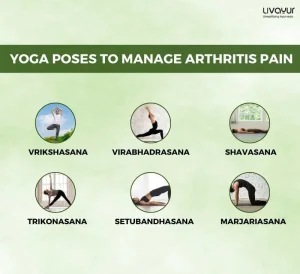This article is reviewed Dr. Shankar Rao

Rheumatoid arthritis (RA) is a chronic autoimmune disease that primarily affects the joints, causing inflammation, pain, and swelling. It is characterized by periods of flare-ups and remission. RA can also affect other organs in the body, leading to systemic complications. In this article, we will explore the symptoms, causes, diagnosis, and treatment options for rheumatoid arthritis from an Ayurvedic perspective.
Symptoms of Rheumatoid Arthritis [1] [2]
The symptoms of rheumatoid arthritis can vary from person to person, but common signs include:
- Joint Pain, Stiffness, and Swelling
The inflammation in the joints causes pain, stiffness, and swelling, especially in the small joints of the hands and feet. The joints may feel warm to the touch.
- Morning Stiffness and Fatigue
Many individuals with RA experience prolonged morning stiffness that can last for hours. Fatigue is also a common symptom, often associated with chronic inflammation.
- Reduced Range of Motion and Joint Deformities
Over time, rheumatoid arthritis can lead to joint deformities and a decreased range of motion. The joints may become misaligned or lose their normal shape.
- Systemic Symptoms
Rheumatoid arthritis is not limited to the joints. It can also affect other organs in the body, leading to systemic symptoms such as fever, weight loss, and general malaise.
- Rheumatoid Nodules
In advanced stages of the disease, rheumatoid nodules may develop under the skin. These are firm lumps that usually occur near joints, such as the elbows or fingers.
Causes of Rheumatoid Arthritis [1] [3]
The exact cause of rheumatoid arthritis is not fully understood, but it is believed to involve a combination of genetic, environmental, and immune system factors. Some potential causes include:
- Genetic Predisposition
Certain genes have been associated with an increased risk of developing rheumatoid arthritis. However, having these genes does not guarantee that a person will develop the disease.
- Autoimmune Response
Rheumatoid arthritis is considered an autoimmune disease, which means that the immune system mistakenly attacks the body’s own tissues, including the synovial membrane lining the joints. This leads to chronic inflammation and joint damage.
- Environmental Triggers
While genetics play a role, environmental factors may also contribute to the development of rheumatoid arthritis. Infections, such as certain bacteria or viruses, may trigger an abnormal immune response in susceptible individuals. Smoking and hormonal factors have also been linked to an increased risk.
Diagnosis of Rheumatoid Arthritis [3]
Diagnosing rheumatoid arthritis involves a combination of clinical evaluation, medical history, and diagnostic tests. Common methods include:
- Physical Examination
The doctor will assess joint tenderness, swelling, and range of motion. They may also look for other signs, such as rheumatoid nodules or joint deformities.
- Blood Tests
Rheumatoid factor (RF) and anti-cyclic citrullinated peptide (anti-CCP) antibodies are commonly tested to aid in the diagnosis of rheumatoid arthritis. These antibodies are found in the blood of many individuals with the disease.
- Imaging Tests
X-rays, ultrasounds, or magnetic resonance imaging (MRI) may be used to assess joint damage, inflammation, and the progression of the disease. These tests can help determine the severity of the condition and guide treatment decisions.
- Joint Aspiration
In some cases, the doctor may perform a joint aspiration, which involves removing a small sample of fluid from an affected joint. This fluid can be examined for signs of inflammation and the presence of certain cells or crystals.
Treatment Options for Rheumatoid Arthritis

Ayurveda offers a comprehensive approach to managing rheumatoid arthritis, focusing on balancing the doshas, reducing inflammation, strengthening the immune system, and improving overall well-being. Treatment options may include:
- Panchakarma Therapies
Panchakarma is a series of detoxification and purification therapies that aim to remove accumulated toxins from the body and restore balance. Therapies such as Abhyanga (Ayurvedic massage), Swedana (herbal steam therapy), and Basti (medicated enema) may be beneficial in managing rheumatoid arthritis [4].
- Herbal Remedies
Ayurvedic herbs such as Guggulu, Shallaki, Ashwagandha, and Turmeric are commonly used to reduce inflammation, relieve pain, and support joint health. These herbs have anti-inflammatory and immunomodulatory properties that can help manage the symptoms of rheumatoid arthritis [5].
- Diet and Lifestyle Modifications
Following an Ayurvedic diet that emphasizes warm, cooked foods and avoids cold, processed, and fried foods can be beneficial. Gentle exercises, such as yoga can help improve flexibility, strengthen muscles, and reduce stress [1] [3].
- Stress Management
Stress can trigger or worsen rheumatoid arthritis symptoms. Practising relaxation techniques, such as meditation, deep breathing exercises, and mindfulness, can help reduce stress and improve overall well-being [3].
- Ayurvedic Formulations
Ayurvedic formulations known as Rasayanas, which are rejuvenating and immune-boosting herbal blends, may be prescribed to support overall health and strengthen the immune system [5].
Conclusion
Rheumatoid arthritis is a chronic autoimmune disease that affects the joints and can lead to systemic complications. Ayurveda offers a comprehensive approach to managing rheumatoid arthritis by addressing the underlying imbalances in the body, reducing inflammation, strengthening the immune system, and improving overall well-being. It is important to consult with an experienced Ayurvedic practitioner for an accurate diagnosis, personalized treatment plan, and guidance on managing rheumatoid arthritis effectively.
FAQs (Frequently Asked Questions)
- Can rheumatoid arthritis be cured permanently?
While there is no known cure for rheumatoid arthritis, Ayurvedic treatments can help manage the symptoms, reduce inflammation, and improve quality of life. Consistent management and adherence to a holistic treatment plan can lead to long-term relief.
- How long does it take to see improvement with Ayurvedic treatment for rheumatoid arthritis?
The duration of improvement varies from person to person. Some individuals may experience relief within a few weeks, while others may require several months of consistent treatment to notice significant improvement. Patience and adherence to the treatment plan are key.
- Can Ayurvedic treatment be used alongside conventional medical treatment for rheumatoid arthritis?
Yes, Ayurvedic treatment can be used alongside conventional medical treatment for rheumatoid arthritis. It is important to inform both your Ayurvedic practitioner and your rheumatologist about the treatments you are receiving to ensure a coordinated approach to your health.
- Are there any dietary restrictions for rheumatoid arthritis in Ayurveda?
Ayurveda recommends avoiding foods that can aggravate inflammation, such as processed sugars, fried foods, and excessive dairy. Instead, emphasis is placed on a wholesome, balanced diet that includes fresh fruits, vegetables, whole grains, lean proteins, and healthy fats.
- Can Ayurvedic treatment prevent joint damage in rheumatoid arthritis?
Ayurvedic treatment aims to reduce inflammation, strengthen the immune system, and improve joint health. While it cannot reverse existing joint damage, it may help slow down the progression of the disease and prevent further joint deterioration.
Disclaimer: The information provided here is for general information and not meant to substitute any medical advice. Please consult your doctor for appropriate medical consultation.
References:
- https://www.cdc.gov/arthritis/basics/rheumatoid-arthritis.html#:~:text=Rheumatoid%20arthritis%2C%20or%20RA%2C%20is,usually%20many%20joints%20at%20once.
- https://www.mayoclinic.org/diseases-conditions/rheumatoid-arthritis/symptoms-causes/syc-20353648
- https://my.clevelandclinic.org/health/diseases/4924-rheumatoid-arthritis#:~:text=Researchers%20think%20it’s%20caused%20by,emotional%20stress%20may%20be%20triggering.
- https://www.lybrate.com/topic/rheumatoid-arthritis-panchakarma-treatment-for-it/75f74ab775900334e44974d766ac32b2#:~:text=Panchakarma%20treatment%20is%20an%20integral,for%20patients%20with%20rheumatoid%20arthritis.
- https://www.ncbi.nlm.nih.gov/pmc/articles/PMC4566784/



















3 Comments